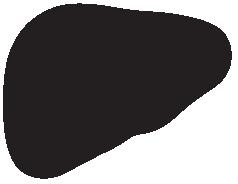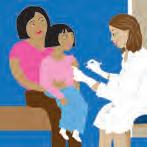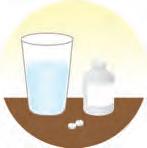

What is the liver and hepatitis B?
The liver is the largest organ in the body. A healthy liver cleans the blood, fights off infection, helps to break down food and nutrients and stores vitamins. Hepatitis B is a virus that is too small to see but it can cause serious sickness in the liver and the body.

How does hepatitis B affect you?

The hepatitis B virus can make the liver inflamed and scarred and then the liver cannot do its job to keep you healthy. Most people with hepatitis B do not feel sick until the disease is very advanced. They have no symptoms. People may start to feel sick, tired, have pain or fever when the liver is very inflamed and scarred.
Most people get hepatitis B as a baby or young child and they have the virus for life. This is called ‘chronic’ hepatitis B. The virus can ‘sleep’ and cause no real health problems for a long time. But the virus can ‘wake up’ in some people and make them very sick.
Of every four people who have chronic hepatitis B one will get liver scarring (known as cirrhosis), liver cancer or liver failure and become very sick if they do not get treatment. A check-up at the doctor every 6 months will help to prevent this.
Sick liver
LIVING WITH CHRONIC HEPATITIS B







Who has chronic hepatitis B?

Many countries have large numbers of people who live with chronic hepatitis B.

Men and women born in:
•Asia
•The Pacific Islands
•Africa
•The Caribbean
•Southern Europe
•The Middle East are more likely to live with hepatitis B. Aboriginal and Torres Strait Islander people also have high rates of hepatitis B.
Hepatitis B is often found in several people in the same family. Most people get hepatitis B when they are a baby or young child. If you have hepatitis B it is important that your brothers, sisters, parents, partner and children are tested to see if they have hepatitis B.
How do you get hepatitis B?
The hepatitis B virus is carried in the blood and sexual fluids. Most people get hepatitis B when they are born or very young. Babies can get hepatitis B at birth if their mother has hepatitis B. If we know the mother has hepatitis B, check-ups and medicines during pregnancy can protect the new born baby from getting the virus.
You may also get it from someone who has hepatitis B by:
Sharing needles and equipment for tattoos, piercing, injecting drugs.
Contact with the blood or open sores of an infected person.

Sharing razors, toothbushes, nail clippers and earrings.
Having sex without a condom.

Tests to check for hepatitis B?

Of every two people who have chronic hepatitis B, one does not know they have it. Ask your doctor or nurse for a simple hepatitis B blood test to check. The results of the test will come back to the doctor in 2 weeks. This test will show:
• If you have chronic hepatitis B, • if you are protected because you had the hepatitis B vaccinations or,
• If you need to have hepatitis B vaccinations.
CLINIC




Check-ups
The hepatitis B virus in your liver changes over time. Check-ups every 6 months are very important and tell the doctor about any damage in your liver. This means having a blood test and maybe an ultrasound or scan. The test results will tell the doctor if you need to start taking medicine. Most people with chronic hepatitis B do not need to take tablets as the virus is ‘sleeping’ and is not causing damage to the liver. The doctor may ask you to see a special hepatitis doctor.
Blood test


Every 6 months
Ultrasound or Scan
Every 6 months
Treatment and medicine


Take tablets every day
You may need to take tablets in the future if the virus ‘wakes up’ and starts to damage your liver. You will need to take these tablets every day to help prevent liver damage and liver cancer. This medicine does not cure hepatitis B and it will not make the virus go away. But it does help to reduce damage to your liver and liver cancer. It helps to keep the virus under control.
It is important to continue to have regular check-ups.
Stay healthy and well
These things help you to be healthy
• Eat a variety of foods. Eat more fruit, vegetables, rice, grains, nuts, fish and tofu.
• Be a healthy body weight
• Exercise and keep active. Try walking with family and friends. Try football, dancing or tai chi.
• Get a check-up at the doctor every 6 months

• Get vaccination for hepatitis A

• Avoid drinking alcohol and taking drugs.
• Stop smoking cigarettes.
• Don’t eat much take-away food, chips, sweets, processed meats, cakes or sweet drinks.
Having a baby

All new born babies in Australia are offered a free course of four hepatitis B vaccinations. These injections usually stop children from getting hepatitis B. If a pregnant woman has hepatitis B she needs to have special check-ups. She may need to take medicine in the last months of pregnancy to stop the baby getting the virus during the birth. The babies of mothers living with chronic hepatitis B are offered an extra injection soon after birth. This will stop most babies from getting the hepatitis B virus. The mother and the baby then need to have regular check-ups for many years.


Caring for your family: Preventing hepatitis B

Hepatitis B vaccination is the best way for your family and those close to you to be protected against hepatitis B. Remember that hepatitis B is often found in several people in the same family. If you have chronic hepatitis B it is important that your brothers, sisters, parents, wife, husband, sexual partner and children are tested to find out if they have hepatitis B. If they have not got hepatitis B they can get a free course of hepatitis B vaccination. It is important to check that family members sharing a house with you know about the vaccination to protect them.
REMEMBER TO TAKE CARE
Vaccination is the best way for your family and those close to you to be protected against hepatitis B.
Clean up blood, cover open sores.
Do not share razors, toothbrushes, nail clippers or earrings.
Do not share needles and equipment for tattoos, piercing or injecting drugs
Use condoms when having sex with a new partner or person who is not vaccinated.


Living with chronic hepatitis B: What does it mean for you?



Some people want to tell friends and family they have chronic hepatitis B. Other people may feel shame and worry - they do not want to talk about hepatitis B.It can be helpful to talk to people who understand you. Take time to decide who you can trust. It is important to think about telling the people in your house and your sexual partners so they can be tested and get a vaccination. It may be helpful to talk about this with your nurse or doctor.



Vaccination can protect people so they don’t get hepatitis B. Chronic hepatitis B can cause liver disease and liver cancer.
Ask your doctor for a blood test to check if you have hepatitis B. Treatment for hepatitis B reduces the chance of liver damage and cancer.
Medicines work well and are easy to take. Get a check-up at the doctor every 6 months if you have chronic hepatitis B.


Acknowledgements
Thank you to the people on the Advisory Group which supported the project. Their advice and support was invaluable.
Concept and Project Manager:
Gabrielle Bennett, Victorian Viral Hepatitis Educator, St Vincent’s Melbourne. Email: gabrielle.bennett@svha.org.au
Advisory Group members:
Kat Byron, Blood Borne Virus Project Officer, Victorian Aboriginal Community Controlled Health Organisation.
Tracey Cabrie, Hepatitis B Nurse Consultant, Melbourne Health. Allison Coehlo, Manager, Multicultural Health and Support Service, Centre for Ethnicity, Culture and Health.
Sue Jaraba, Refugee Health Nurse, ISIS Primary Care Rosealie Vallance, Program Officer, Melbourne Primary Care Network Louisa Walsh, Hepatitis Victoria
Funded by: Melbourne Primary Care Network
Illustrations: Jenny Bowman Email: jenbowman@netspace.net.au
Graphic design: Ray Hehr, Swivel Design Email: info@swivel-design.com.au
Process evaluation: Leonie Morgan

Many other people have contributed to this work and supported the development and implementation of the project. Thanks to the people who participated in the focus groups, health workers who reviewed the draft and participated in an interview, staff at ISIS Primary Care and at North Richmond Community Health Centre who assisted and supported the focus groups and Interpreter Services, St Vincent’s Hospital.
This book is available online and as online videos in several languages.
For the original booklet, go to www.svhm.org.au/health-professionals/specialistclinics/g/gastroenterology/resources
For the NSW booklet, go to www.hep.org.au/key-services/free-hepatitis-resources/





 Supported by
© St Vincent’s Hospital Melbourne, 2nd edition December 2015 (NSW version)
Supported by
© St Vincent’s Hospital Melbourne, 2nd edition December 2015 (NSW version)
